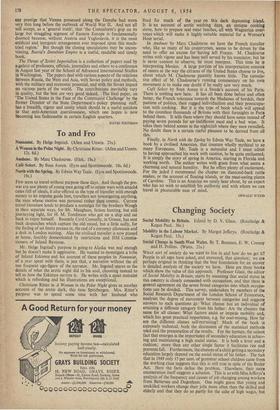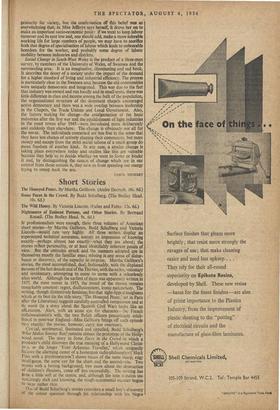Changing Society
Social Mobility in Britain. Edited by D. V. Glass. (Routledge & Kegan Paul. 36s.) Social Change in South-West Wales. By T. Brennan, E. W. Cooney and H. Pollins. (Watts. 21s.)
WHAT sort of society do we want to live in and how do we get it? People in all ages have asked, and answered, that question; we are perhaps original in thinking that the best foundation for an answer is detailed analysis of the society we have. Here are three books which show the value of this approach. Professor Glass, the editor of Social Mobility in Britain, starts by assuming that social status in this country is closely connected with occupation, and that there is general agreement on the seven broad categories into which occupa- tions can be divided. This survey, undertaken by members of the Social Research Department of the London School of Economics, analyses the degree of movement between categories and suggests answers to such questions as: What chance has an individual of attaining a different category from his father: Are the chances the same for all classes: What factors assist or impede mobility and, which has great practical importance, e.g. for coal-mining. How far are the different classes self-recruiting? Much of the book is extremely technical, both the discussion of the statistical methods used and the presentation of the results. For the layman, the salient fact that emerges is the importadce of secondary education in achiev- ing and maintaining a high social status. It is both a lever and a cushion; more than any other single factor it facilitates rise and prevents fall. Furthermore, the chances of a child getting a secondary education largely depend on the social status of his father. The fact that in 1949 only 15 per cent. of grammar school children came from the working class suggests that this is still true in spite of the Butler Act. Here the facts define the problem. Elsewhere, their mere enumeration itself suggests a solution. This is so with Miss Jefferys's analysis of the frequency and causes of job changing among workers from Battersea and Dagenham. One might guess that young and unskilled workers change their jobs more often than the skilled and elderly and that they do so partly for the sake of high wages, but
primarily for variety, but the confirmation of this belief was so overwhelming that, as Miss Jefferys says herself; it drove her on to make an important socio-economic point: if we want to keep labour turnover and its cost low and, one should add, make a more tolerable working life for large numbers of people, we may have to sacrifice both that degree of specialisation of labour which leads to unbearable boredom for the worker, and probably some degree of labour mobility between industries and districts.
Social Change in South-West Wales is the product of a three-man' survey, by members of the University of Wales, of Swansea and the surrounding area. It is an imaginative, illuminating and sad book. It describes the decay of a society under the impact of the demand for a higher standard of living and industrial efficiency. The process is particularly clear in the Swansea area because the old communities were uniquely democratic and integrated. This was due to the fact that industry was owned and run locally and in small.units, there was little difference in class and income among the bulk of the population, the organisational structure of the dominant chapels encouraged active democracy and there was a wide overlap between leadership in the Chapels, the Trade Unions and Local Government. Also, the factors making for change—the amalgamation of the basic industries after the first war and the establishment of light industries in the coast towns after 1945—were introduced more deliberately and suddenly than elsewhere. The change is obviously not all for the worse. The individuals concerned are less free in the sense that they have less chance of actively shaping their community, but more money and escape from the strict social taboos of a small group do• mean freedom of another kind. In any case, a similar change is taking place everywhere today and studies like this are valuable because they help us to decide whether we want to foster or hinder it and, by distinguishing the causls of change which are in our control from those outside it, they save us from spending our energy trying to sweep back the sea.
CAROL STEWART



































 Previous page
Previous page